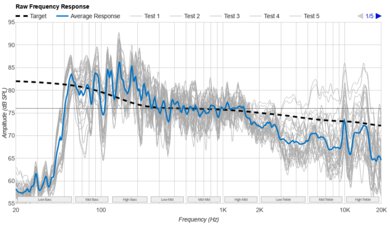The Anker Soundcore Rave Neo 2 is a portable stereo speaker with colorful RGB lighting and an IPX7 rating, which means it can be fully immersed in water. It can even float, so you needn't worry if this speaker takes a tumble into the water. The manufacturer advertises up to 18 hours of battery life for all-day performance, and it features Anker's proprietary BassUp technology, which promises to inject some boom and rumble into the mix.
Our Verdict
The Anker Rave Neo 2 is okay for music. It has a punchy sound with its BassUp feature enabled that provides plenty of clarity for kicks and basslines, especially in genres like EDM and hip-hop. That said, it has an underemphasized response across the treble range that results in veiled-sounding vocals and speech with dull, lispy-sounding sibilants. While it can play stereo content, directivity isn't the best, so you'll need to be careful about positioning yourself in relation to the speaker. It can get loud enough to soundtrack smaller outdoor parties, but there's quite a bit of compression at max volume, so you'll likely hear some pumping artifacts in the bass range.
IPX7 rating, so it can be submerged in water.
- Graphic EQ and presets in app.
- Bluetooth multipoint with up to two devices.
- Some compression at max volume.
- Disappointing directivity.
- No rating against dust damage.
The Anker Rave Neo 2 is sub-par for videos and movies. Its punchy sound profile can help bring out horns and other lower-frequency elements in soundtracks, but the bass range doesn't extend low enough to render explosions in an exciting way. It can get loud enough for movie nights, but there's a fair bit of compression in the bass range around max volume. Its directivity isn't the best either, so not everyone will experience consistent audio delivery. Audiovisual synchronization error is reasonable with Android devices but slightly lower with iOS devices, so it's possible you'll experience some lip-sync issues when watching video content. Apps and devices compensate for this differently.
- Graphic EQ and presets in app.
- Portable design with carrying handle.
- Some compression at max volume.
- Disappointing directivity.
- AV synchronization error is mediocre with iOS devices.
The Anker Rave Neo 2 is decent for podcasts. It can get pretty loud, and although there's some compression at max volume, it's mostly concentrated in the bass range, so vocals and speech are less affected. It's pretty portable, so you can take your favorite podcast hosts with you on the go. That said, the veiled treble response means that their voices lack a bit of definition, and sibilants, like S and T sounds, can sound lispy. The disappointing directivity is something to watch out for, as audio delivery isn't consistent across all listening angles.
- Graphic EQ and presets in app.
- Almost 14 hours of battery life.
- Bluetooth multipoint with up to two devices.
- Some compression at max volume.
- Disappointing directivity.
- No rating against dust damage.
The Anker Rave Neo 2 has no voice assistant integration, so it's not suitable for this use.
The Anker Rave Neo 2 is decent for outdoor use. It's very portable and solidly built, with an IPX7 rating for full immersion in water and sturdy plastic and metal construction. Its almost 14 hours of continuous battery life means it's well-equipped to provide the tunes for a few weekend dance parties before needing a charge. It's loud enough for smaller-scale outdoor events, though there'll be some compression in the bass range as you approach max volume. Sadly, its front-facing design means that audio delivery won't be consistent across every listening angle.
IPX7 rating, so it can be submerged in water.
- Almost 14 hours of battery life.
- Portable design with carrying handle.
- Some compression at max volume.
- Disappointing directivity.
- No rating against dust damage.
Check Price
Differences Between Sizes And Variants
The Anker Rave Neo 2 is available in one color variant: 'Black'. You can see our unit's label here. You'll also see this speaker advertised as the Anker Rave Neo 2 SE, which is sold through Costco. Aside from the name, all the specifications seem identical between these two variants.
If you encounter another variant of this speaker, please let us know in the forums, and we'll update our review.
Popular Speaker Comparisons
The Anker Rave Neo 2 is a portable speaker with RGB lights. It bridges the gap between smaller, more lightweight speakers like the Anker Soundcore Boom 2 and larger party speakers like the JBL PartyBox 110. In some aspects, this means it gets the best of both worlds, as this speaker can get louder than the Anker Soundcore Boom 2 and has a punchier bass. It compresses more at max volume, though, and its battery isn't quite as long as the smaller speaker. It's comparable in performance to the similarly-sized Tribit StormBox Blast. The more expensive Tribit has a longer battery life and better directivity, though its RGB lighting is more pared down compared to the Anker.
You can also check out our recommendations for the best Bluetooth speakers, the best-sounding Bluetooth speakers, and the best Bluetooth speakers for bass.
The Anker Soundcore Boom 2 is a more compact speaker than the Anker Soundcore Rave Neo 2. It can't get as loud as the Rave 2 Neo, but if this isn't a dealbreaker, the Boom 2 offers more bang for your buck. Both speakers have a similar sound, though the Rave Neo 2 has a touch more bass. However, the Boom 2 is more portable, compresses less at max volume, and has a longer continuous battery life. While both speakers are capable of stereo playback, the Boom 2 has better directivity, so audio sounds a bit more consistent across different listening angles.
The Anker Soundcore Rave Neo 2 and the Tribit StormBox Blast are portable speakers with similar form factors, although the Tribit is slightly heavier. They have similar build qualities and are submersible in water, thanks to their IPx7 ratings. When it comes to sound, they offer a comparable performance. They both pack some punch in the low end and have a balanced mid-range, but the Anker has a somewhat veiled treble response that can dull vocals and speech. By contrast, the Tribit overemphasizes the same range, so vocals can sound a tad sharp. The Tribit can get louder, though, and has better directivity. It also has a considerably longer battery life of over 32 hours. That said, you can pair the Anker with other Anker speakers for stereo or party mode, so it's better suited to a multi-speaker setup.
The Ultimate Ears MEGABOOM 3 is quite a bit smaller than the Anker Soundcore Rave Neo 2, and ultimately, they have different strengths. The Anker can get louder and has a more balanced sound overall; it features RGB lights for an extra wow factor at your next party. You can also pair up to two devices simultaneously via Bluetooth, in case you and a friend want to share DJ duties. However, the Ultimate Ears is a lot more portable, much better built, and compresses less at max volume. Its directivity is also much better, so audio delivery is a lot more consistent at different angles around the speaker.
The JBL PartyBox 110 and the Anker Soundcore Rave 2 Neo are both party-oriented speakers with built-in RGB light shows. When it comes to bringing the party, it's tough to beat the JBL, though this does come with a more premium price tag. The two speakers are similar when it comes to build quality and battery life (both clock in at around 14 hours), but the similarities mostly end here. The JBL is quite a bit heavier and less portable but packs more of a low-end punch. It's also got a bit more emphasis in the high-end, whereas the Anker is recessed in this range, resulting in more present vocals and lead instruments. While the JBL has better directivity, surprisingly, there's not too much of a difference between the two speakers' max volumes. The JBL compresses quite a bit less at max volume, though. If you need the extra bass and want purer audio at a higher volume, the JBL is worth the additional outlay.
Test Results


The Anker Rave Neo 2 has an oblong shape and is designed to sit vertically. It sports an integrated carrying strap to help move it around, and four rubber feet at the bottom of the speaker help keep it stable. The front of the speaker is covered by a metal grille emblazoned with the Soundcore logo. There are RGB lights on both the woofer and tweeters, too, which can help put on a colorful light show. It's available in just one color variant: 'Black.'
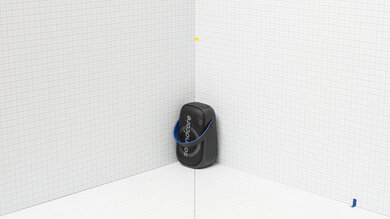
This speaker is very portable. It's relatively lightweight, and the built-in carry handle makes it a breeze to carry around in one hand. It's battery-powered, so you needn't worry about staying close to an outlet.

This speaker has a decent build quality. It's rated IPX7 for full immersion in water and can even float, which is sure to be a fun novelty at your next pool party. However, the manufacturer doesn't specify whether it's dust-resistant. It's constructed mostly of solid, sturdy plastic, with a metal grille covering the woofer and tweeters. The physical buttons are clicky and responsive, and the integrated carrying strap seems solidly attached. The speaker sits on rubber feet to help it remain stable on any surface.
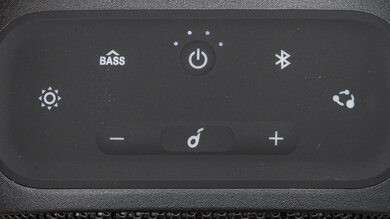
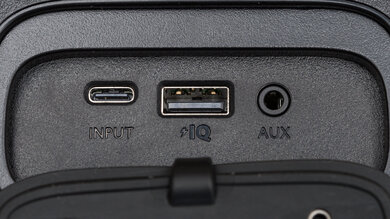
All the physical controls are located on the top of the speakers. The buttons themselves are easy to press and have a satisfying click when pressed. There are chimes that play when buttons are pressed, when lights are enabled, or when features like BassUp, PartyCast, and Bluetooth are enabled. There are also four LED lights above the power button that display the battery status. Additional feedback is provided in the form of the power button flashing at minimum and maximum volume, as well as the LED over the woofer displaying the overall volume level. You can see the complete list of controls here.

- Anker Soundcore Rave Neo 2
- USB-C to USB-C charging cable (1.9ft / 60cm)
- Quick start guide
- User guide
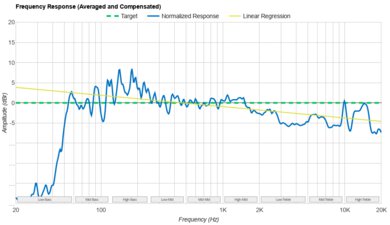
We tested the Anker Rave Neo 2 using the default Soundcore Signature EQ preset, with the BassUp feature engaged and the speaker placed vertically. While it doesn't produce as much bass as a larger speaker, it can still introduce some punch to kicks and basslines, making it well-suited to hip-hop and electronic music. As with the Anker Soundcore Boom 2, the entire treble range is quite veiled, which diminishes the detail in vocals and speech-centric content, like podcasts. Sibilants like S and T sounds can come across as a little dull and lispy. However, you can mitigate this effect somewhat by using either the 'Voice' or 'Treble Boost' presets, though this comes at the expense of bass emphasis. You can use the graphic EQ and presets in the companion app to further tailor the sound to your liking. You can also see how the BassUp feature boosts the low-end here.
It's worth noting that this speaker has a high noise floor that can be heard when it isn't playing music. Some users will find this annoying, and unfortunately, the issue persisted despite following Anker's troubleshooting steps.
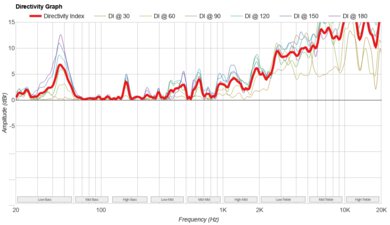
This speaker has an okay soundstage performance. While it's capable of stereo playback, there's only one woofer, and the two tweeters are positioned close together. As a result, it can still be difficult to observe true L/R separation, even in songs with more intense panning. Its directivity is disappointing, too, due to its front-facing design, so audio delivery isn't consistent across all listening angles.
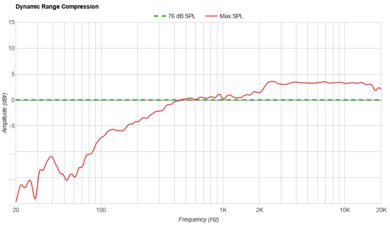
The Anker Rave Neo 2 has a passable dynamics performance. While it can get loud enough to soundtrack your next pool party (so long as it's not an Olympic-sized pool), there's quite a bit of compression present at max volume. If you crank up the volume, you'll hear some pumping artifacts, especially in the bass range.
This speaker has a great battery performance. The manufacturer advertises up to 18 hours of battery life. We measured nearly 14 hours of battery life at 80dB with lights disabled and the BassUP feature engaged. This is still impressive and enough to get you through a weekend's worth of tunes without needing a recharge. That said, battery life will vary according to a number of factors, including the type of audio output, the EQ preset, the volume, and whether you use the lights. There's also a handy auto-off feature that switches the speaker off after 20 minutes of inactivity by default. You can toggle this in the app though to an interval of 5, 10, 20, or 60 minutes.
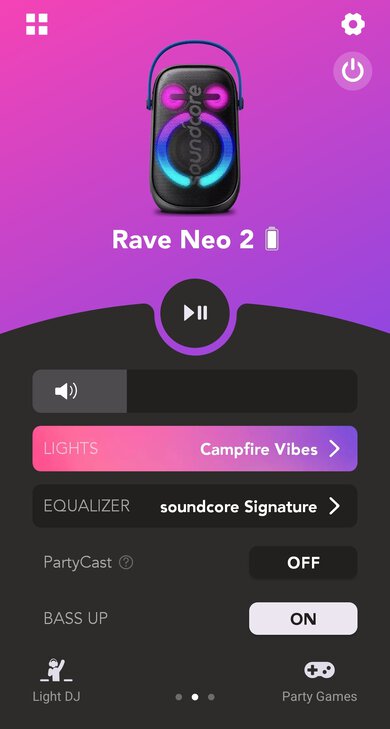
The Soundcore app allows you to access a variety of different features and gives you a few parameters to tweak. It lets you adjust basic settings like the volume and BassUp feature and tweak the sound via a graphic EQ and presets. You can also change the time taken for the auto-off timer to kick in and toggle voice prompts. The app lets you pair up to 100 Rave Neo 2 speakers at once via PartyCast for massive party sound, or you can pair two speakers for a stereo configuration. You can see a video of the app in action here.
This speaker has an AUX input, so you can connect your devices using a 3.5mm TRS cable. There's also a USB-A port to charge your devices or connect a hard drive. The speaker charges via a USB-C charge port, which you can't use for anything other than charging.
The Bluetooth performance is great. This speaker allows you to pair up to two devices simultaneously. Audiovisual synchronization error is okay with Android devices, so you'll experience minimal lag between your audio and your visuals. It's a bit higher with iOS devices, though. That said, different apps and devices compensate for latency differently, so your experience may vary.

